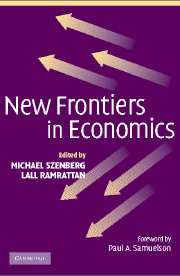Book contents
- Frontmatter
- Contents
- List of Contributors
- Foreword by Paul A. Samuelson
- Preface
- Acknowledgments
- Introduction
- PART I INFORMATIONAL BEHAVIORAL ECONOMICS AND FINANCE
- PART II MACROECONOMICS AND PUBLIC POLICIES
- PART III INTERNATIONAL TRADE AND DEVELOPMENT
- 7 Economic Theory and the Interpretation of GATT/WTO
- 8 What's New in Development Economics?
- PART IV CONTRACTS, LAW, AND GAMING
- Author Index
- Subject Index
- References
7 - Economic Theory and the Interpretation of GATT/WTO
Published online by Cambridge University Press: 06 July 2010
- Frontmatter
- Contents
- List of Contributors
- Foreword by Paul A. Samuelson
- Preface
- Acknowledgments
- Introduction
- PART I INFORMATIONAL BEHAVIORAL ECONOMICS AND FINANCE
- PART II MACROECONOMICS AND PUBLIC POLICIES
- PART III INTERNATIONAL TRADE AND DEVELOPMENT
- 7 Economic Theory and the Interpretation of GATT/WTO
- 8 What's New in Development Economics?
- PART IV CONTRACTS, LAW, AND GAMING
- Author Index
- Subject Index
- References
Summary
INTRODUCTION
Over the postwar period, the General Agreement on Tariffs and Trade (GATT) has sponsored eight rounds of trade-policy negotiations. The most recent round of negotiations, which was completed in 1994, resulted in the creation of the World Trade Organization (WTO). The WTO includes the text of GATT, but it also goes further and embodies a set of agreements that build on and extend GATT principles to new areas. The central role played in the world economy by GATT/WTO is widely accepted. Indeed, through the eight rounds of GATT negotiations, the average ad valorem tariff on industrial goods has fallen from over 40 percent to below 4 percent. Over this period, GATT/WTO membership has also grown in number from twenty-three to now over 140 countries.
Given the significant influence of GATT/WTO on the world economy, it is of special importance to assess the progress that economists have made in providing a theoretical interpretation of GATT/WTO. This is the focus of the present essay. Our discussion proceeds in three broad steps. First, we consider the theory of trade agreements. We organize our discussion here around a simple but fundamental question: What is the problem that a trade agreement might solve? Second, we briefly describe the history and institutional design of GATT/WTO. Finally, we draw on the recent theoretical literature and interpret the design of GATT/WTO. Our discussion examines two key features of GATT/WTO: reciprocity and enforcement.
- Type
- Chapter
- Information
- New Frontiers in Economics , pp. 205 - 234Publisher: Cambridge University PressPrint publication year: 2004
References
- 3
- Cited by



